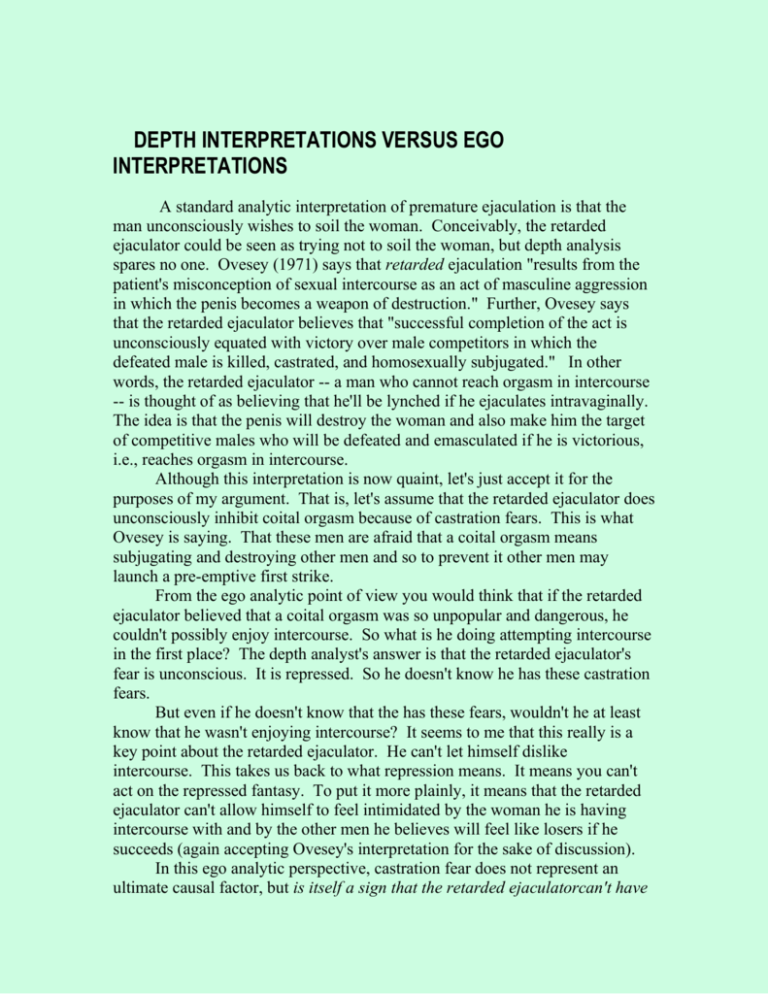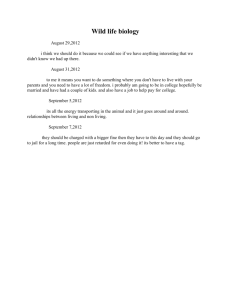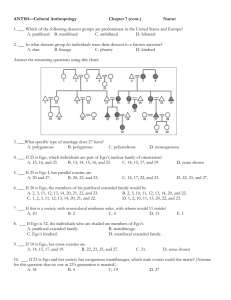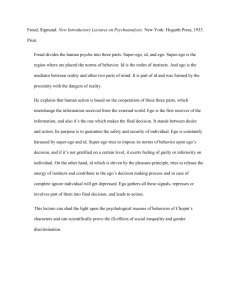
DEPTH INTERPRETATIONS VERSUS EGO
INTERPRETATIONS
A standard analytic interpretation of premature ejaculation is that the
man unconsciously wishes to soil the woman. Conceivably, the retarded
ejaculator could be seen as trying not to soil the woman, but depth analysis
spares no one. Ovesey (1971) says that retarded ejaculation "results from the
patient's misconception of sexual intercourse as an act of masculine aggression
in which the penis becomes a weapon of destruction." Further, Ovesey says
that the retarded ejaculator believes that "successful completion of the act is
unconsciously equated with victory over male competitors in which the
defeated male is killed, castrated, and homosexually subjugated." In other
words, the retarded ejaculator -- a man who cannot reach orgasm in intercourse
-- is thought of as believing that he'll be lynched if he ejaculates intravaginally.
The idea is that the penis will destroy the woman and also make him the target
of competitive males who will be defeated and emasculated if he is victorious,
i.e., reaches orgasm in intercourse.
Although this interpretation is now quaint, let's just accept it for the
purposes of my argument. That is, let's assume that the retarded ejaculator does
unconsciously inhibit coital orgasm because of castration fears. This is what
Ovesey is saying. That these men are afraid that a coital orgasm means
subjugating and destroying other men and so to prevent it other men may
launch a pre-emptive first strike.
From the ego analytic point of view you would think that if the retarded
ejaculator believed that a coital orgasm was so unpopular and dangerous, he
couldn't possibly enjoy intercourse. So what is he doing attempting intercourse
in the first place? The depth analyst's answer is that the retarded ejaculator's
fear is unconscious. It is repressed. So he doesn't know he has these castration
fears.
But even if he doesn't know that the has these fears, wouldn't he at least
know that he wasn't enjoying intercourse? It seems to me that this really is a
key point about the retarded ejaculator. He can't let himself dislike
intercourse. This takes us back to what repression means. It means you can't
act on the repressed fantasy. To put it more plainly, it means that the retarded
ejaculator can't allow himself to feel intimidated by the woman he is having
intercourse with and by the other men he believes will feel like losers if he
succeeds (again accepting Ovesey's interpretation for the sake of discussion).
In this ego analytic perspective, castration fear does not represent an
ultimate causal factor, but is itself a sign that the retarded ejaculatorcan't have
a good reason to dislike intercourse. He doesn't feel entitled to notice how
tense it makes him. He also is notorious for vagina dentata fantasies (the
vagina with teeth). In the ego analytic perspective this indicates that he does
not feel entitled to the experience of being trapped in intercourse: the
experience of his penis not really being his. In other words, if he had a right to
feel trapped and oppressed by women, his vagina dentata fantasies would
evaporate.
What we have, then, is a man stuck in the male role. He has to perform
and to not ask the reason why. If he lets himself notice that he feels tense,
intimidated and vulnerable -- for whatever reason -- this means to him that he is
weak and inadequate. If he is just helped to get over his fears, as by imaginal
or in vivo desensitization, this is likely to reinforce his compliance with male
role demands. He may then be even less likely to allow himself to be tense or
vulnerable or to feel used.
To recapitulate: when the depth therapist arrives at the idea that the
retarded ejaculator is intimidated by other men, the treatment strategy is to
work on that problem. But, to the ego analyst the problem is not that the
patient is intimidated by other men, but that he is afraid of being intimidated by
other men. That's what repression means. If he could allow himself to be
intimidated by other men, he would simply experience this directly. He would
not then be inhibited in competition.
This is often a hard idea to grasp because it just seems like this man must
be helped to not feel vulnerable and intimidated. To help someone accept
feeling scared of the opposite sex runs into mental health norms that most
therapists share. According to these norms you shouldn't be afraid of people.
The trouble is that it is that very belief that causes these fears to be experienced
indirectly.
REPRESSION
However, it seems to me that these norms wouldn't influence us that
much if it were not for the way the concept of repression makes it difficult to
think about the problem. Let me take as an example a worldwide symptomatic
expression of men's fear of women: the idea that it is unhealthy and physically
dangerous to be around women. Here is a summary statement from the
anthropologist Fisher (1980, p. 173):
One of the most striking aspects of the anthropological literature
on sexuality is the near-universal concern that men have about pollution or
contamination resulting from contact with women. One example is a belief
from the Kaluli of New Guinea:
.
The man who spends too much time in the women's section...who touches
his wife too often or who eats food a woman has stepped over is likely to
become emaciated, to develop a cough, or to lose his endurance on the trail.
Another example is from Davenport's (1977, p. 126) summary of the
anthropological literature on sexuality. Among the Dobu of New Guinea:
Husbands are continually in fear of sorcery from their wives. They
are particularly vulnerable to sorcery during intercourse; hence, a man is
continually weighing the gratification of sexual desires against the possibility
of sorcery as a result of that gratification.
This belief is found even in the midst of the legendary sexual freedom of
Polynesia. Margaret Mead (1928, p. 81) generalized that for all of Polynesia:
"All women, and especially menstruating women, are considered
contaminating and dangerous."
The fear of menstrual blood and contamination by women during
menstruation is almost universal among preliterate societies and is elsewhere
widespread as well. To this we can add requiring women to wear veils,
hobbling their feet, and surgically mutilating their genitals.
So it's men who fear castration but the women who are castrated. From
the ego analytic point of view women in these cultures would not have to be
treated punitively, or phobically avoided, if the men were at the level of ego
development that made it possible for them to recognize and respect their own
vulnerability. If this was accomplished then these men would have
psychological explanations for their fear of women rather than magicalparanoid and hypochondriacal ones.
Let's say a man notices that when he is alone with a woman he is
attracted to, he finds that his mouth gets dry, he sweats, and tightens up. At one
level of ego development he says "I'm feeling shy." But at another level of ego
development another man thinks he is a victim of sorcery. He thinks that
women have a strange power over him. He doesn't have to feel weak and
inadequate. He thinks it's brave of him to be around women at all, especially
since you can never tell when they are menstruating.
Does it help to say that these men who are afraid of sorcery are
repressing their fear of women? And if the repression is lifted they would be in
touch with their fear? Such an idea overlooks the centuries of conceptual and
linguistic development it has taken to make the idea of shyness available. The
whole idea that one can be psychologically threatened by the opposite sex is a
recent acquisition and one that seems to be limited to literate Western
societies. To get to it we had to go through all kinds of denials and projections
(notions of witchcraft, demonical possession, and bodily vapors and poisons).







